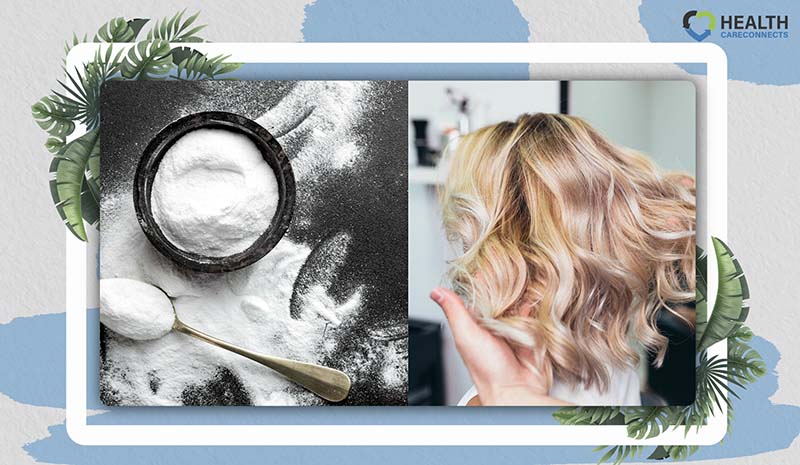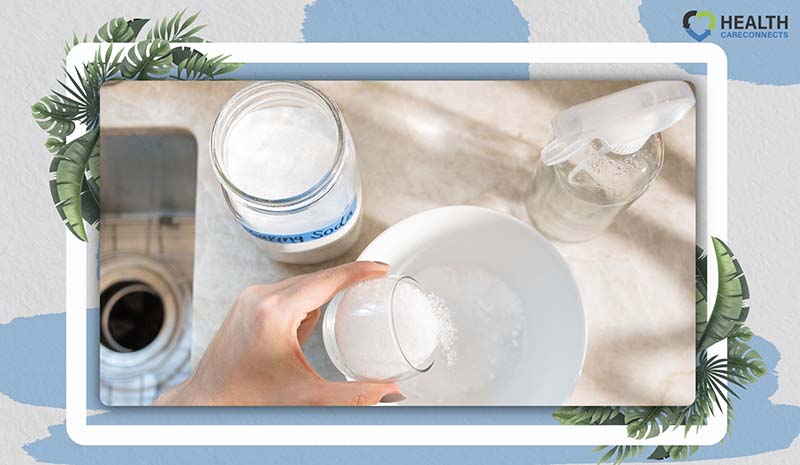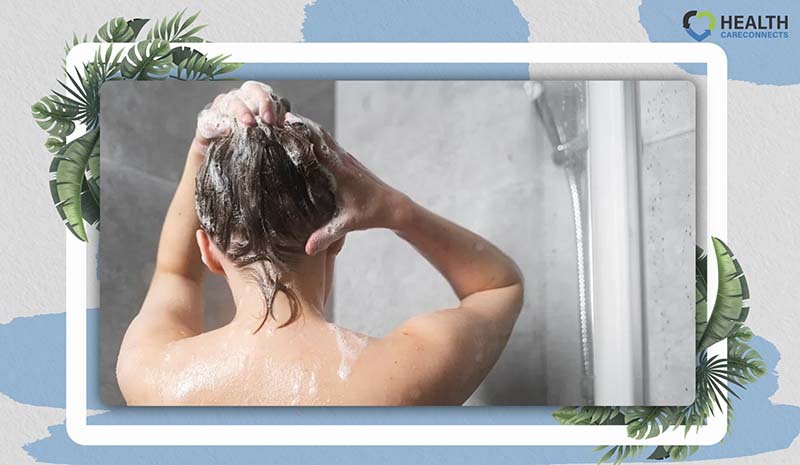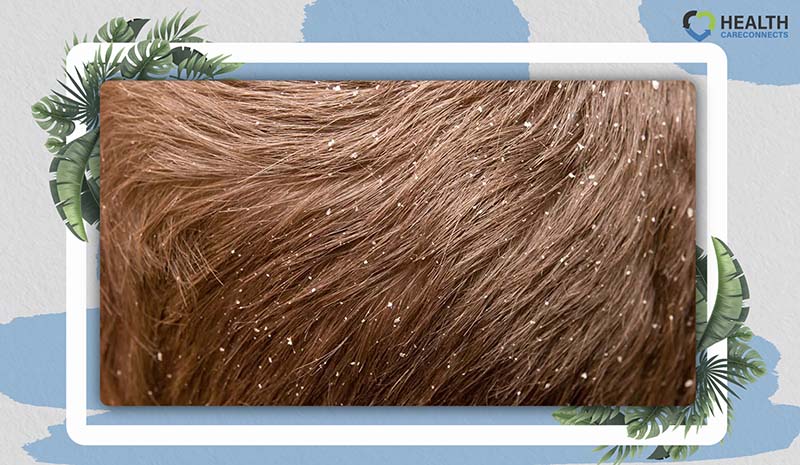Baking soda, renowned for its versatility, serves many purposes beyond its familiar role in the kitchen. From aiding in the rising of bread dough to acting as a cleaning agent for numerous household items, it’s truly a multifunctional ingredient.
One lesser – known but highly effective use of baking soda is as a substitute for shampoo. This natural compound can be especially beneficial for individuals with oily scalps, offering a budget-friendly and chemical-free way to achieve squeaky clean hair.
Discover how to wash hair with baking soda and explore this natural beauty hack to enhance your hair care routine.
Benefits of Washing Hair With Baking Soda
Baking soda dissolved in water effectively removes buildup from oils, soaps, and other ingredients found in typical hair care products. This process can leave your hair feeling squeaky-clean, shiny, and soft.
The powdery texture of baking soda also makes it an excellent exfoliant, helping to remove dry skin from the scalp. For those concerned about additives in commercial shampoos or looking to save money, baking soda can be a great alternative.
Many people rinse their hair with apple cider vinegar after washing with baking soda. Baking soda has a high pH, and the vinegar rinse helps to restore the scalp’s natural pH balance.
While some individuals use this technique daily, many prefer to use it once a week. Some report good results with this method, but it’s important to note that scientific evidence does not support these claims.
Notes:
- Gradual Introduction: If you’re new to using baking soda for hair care, start with a small amount and gradually increase as needed.
- Monitor Hair Health: Keep an eye on your hair’s condition. If you notice dryness or damage, reduce the frequency of use.
- Complementary Care: Incorporate a good conditioner or hair mask to maintain moisture and health.

Disadvantages of Baking Soda Shampoo
While baking soda is effective for cleaning grills, stoves, and stainless-steel sinks due to its abrasive composition, the small crystals in baking soda may be too harsh for hair.
Its high alkalinity and higher pH level than the scalp can pose several risks.
Risks of Using Baking Soda on Hair:
- Dryness: Although baking soda cleans well, it can strip the hair of its natural oils, leading to dryness. Natural oils are essential for maintaining a healthy scalp, and removing too much can make hair look dull. Commercial shampoos often include moisturizing ingredients, unlike baking soda. To counteract dryness, use a natural conditioner with coconut or argan oils.
- Breakage: As a type of salt, baking soda consists of tiny, abrasive crystals that can tear delicate hair fibers, causing split ends and breakage.
- Scalp Irritation: Baking soda may irritate the scalp, especially for those with dry scalps, dry skin, or conditions like eczema. It is not recommended for individuals with these conditions.
Notes:
- Use Occasionally: Limit the use of baking soda to avoid over-exfoliating and damaging your hair and scalp.
- Pair with Gentle Products: Combine baking soda treatments with gentle, moisturizing hair products to mitigate potential dryness and damage.
- Monitor Reaction: Pay attention to how your scalp and hair respond. Discontinue use if you notice increased dryness, irritation, or breakage.
How to Wash Hair With Baking Soda Properly
For those interested in washing their hair with baking soda (remember to use it sparingly), here’s a safe method to do so.
- Make a Baking Soda Paste: Combine two parts water and one part baking soda in a small bowl.

- Apply to Hair: Spread the baking soda mixture onto wet or dry hair, focusing on any oily spots on the scalp. Start at the roots and work your way down to the ends.
- Let it Sit and Rinse: Leave the baking soda paste on your hair for about three minutes, then rinse thoroughly.
- Wash and Condition Your Hair: After rinsing off the baking soda, follow with a gentle moisturizing shampoo and conditioner.

Notes:
- Avoid Overuse: Use baking soda as a hair cleanser no more than once a week to prevent dryness and damage.
- Rinse with Vinegar: Consider rinsing with diluted apple cider vinegar after using baking soda to help balance the scalp’s pH.
When Should You Use Baking Soda Shampoo?
Here are some instances when using baking soda shampoo might be beneficial:
- Clarifying Hair: Baking soda effectively removes buildup from hair products, oils, and hard water minerals. If your hair feels heavy or looks dull due to product buildup, using baking soda shampoo occasionally can help clarify it.
- Oily Scalp: For those with an oily scalp, baking soda can help reduce excess oil, leaving your hair feeling cleaner for longer periods.
- Dandruff: Some people find that baking soda helps with dandruff by gently exfoliating the scalp and reducing flakes.

- Natural Hair Care: If you prefer to avoid commercial shampoos with synthetic ingredients, baking soda can be a natural alternative for cleansing your hair.
Who Should Use Baking Soda on Hair?
Experts advise against using baking soda on hair regularly due to its harshness. Only those with very oily scalps or hair might consider using it occasionally, perhaps once a month.
You should only use Baking Soda when you get:
- Dry Scalp or Hair: Baking soda can exacerbate dryness, making it unsuitable for those with already dry scalps or hair.
- Damaged Hair: If your hair is damaged or fragile, baking soda can worsen the condition.
- Color-Treated Hair: Baking soda can strip color from treated hair, leading to fading and damage.
The potential negative effects of using baking soda often outweigh any benefits, so caution and infrequent use are recommended for those who decide to try it.
Alternatives to Baking Soda Shampoo
For those who prefer natural hair care products, there are several alternatives to baking soda that cater to different hair types:
- Coconut Oil: Ideal for sealing in moisture, coconut oil is beneficial for dry hair. It can be found in most natural food stores and purchased online. It helps maintain hydration and adds shine.
- Aloe Vera: Known for its soothing properties, aloe vera contains an enzyme that can stimulate hair follicles and promote growth. It also helps soothe dry, irritated scalps.
- Jojoba Oil: Similar to the natural oil produced by the scalp, jojoba oil helps balance oil production and treat dry hair. It is widely available in various products online and in stores.
Notes:
- Combination Use: These natural ingredients can be combined for enhanced benefits, such as mixing aloe vera with jojoba oil for a soothing, hydrating treatment.
- Hydrate and Protect: Always follow up with a good conditioner to restore moisture and protect your hair.
Conclusion
While baking soda can indeed be a transformative addition to your hair care regimen, it’s essential to approach its use with care and moderation. The key is to integrate baking soda treatments into your routine thoughtfully, ensuring not to overuse it, as its alkaline nature can alter your scalp’s natural pH balance.
When used correctly, baking soda not only clarifies and cleanses but also maintains the health and vibrancy of your hair. For those interested in exploring this natural solution, learning how to wash hair with baking soda can be the first step towards unlocking the secret to naturally beautiful hair.
This method promises to leave your hair feeling revitalized and looking its best, embodying the healthy, lustrous locks you’ve always desired.
For those seeking more information and honest product reviews, I recommend visiting HealthCareConnect.

Dr. Joyce Slater: Your Guide to Informed Health Choices
Dr. Joyce Slater shines as a distinguished expert in the field of nutrition and public health. Contributing her vast expertise to HealthConnectbc, she embodies a deep-seated passion for enhancing public well-being. As a respected figure in her field. Dr. Slater’s academic journey and professional achievements are nothing short of inspirational.
Holding a significant position as a researcher and educator, Dr. Slater has delved deeply into the intricacies of food literacy and nutritional science. Her work, prominently featured in numerous esteemed scientific publications, underscores her dedication to expanding our understanding of food’s role in health and society.
At the heart of Dr. Slater’s professional ethos is a profound desire to positively impact individual lives through education and research. She often says, “Empowering people with the knowledge to make healthier choices is the most rewarding aspect of my work.” This principle is the cornerstone of her involvement with HealthConnectbc, where she strives to provide reliable and practical health advice.
Dr. Slater’s contributions to HealthConnectbc are multifaceted: academically, she offers insights into the complex world of nutrition and health, enhancing both public understanding and professional practices. Additionally, she is instrumental in guiding and inspiring the next generation of health professionals, thus fostering future excellence in the field.
Juggling rigorous research with her educational duties, Dr. Slater demonstrates an unwavering commitment to her profession. Her approachable nature and genuine concern transcend the confines of academia, touching the lives of everyone she interacts with. Dr. Slater looks forward to continuing her journey of discovery and education, dedicated to the ongoing improvement of public health and nutrition.
At HealthConnectbc, Dr. J. Slater is not just a contributor; she is a guiding light, dedicated to enlightening and motivating individuals towards a healthier and more informed lifestyle.
PUBLISHED ARTICLES
- Food literacy competencies: A conceptual framework for youth transitioning to adulthood (2018)
- Self-perceived eating habits and food skills of Canadians (2016)
- Challenges to acquiring and utilizing food literacy: Perceptions of young Canadian adults (2016)
- Socio-demographic and geographic analysis of overweight and obesity in Canadian adults (2009)
- Sustainable well-being: Concepts, issues, and educational practices (2014)

